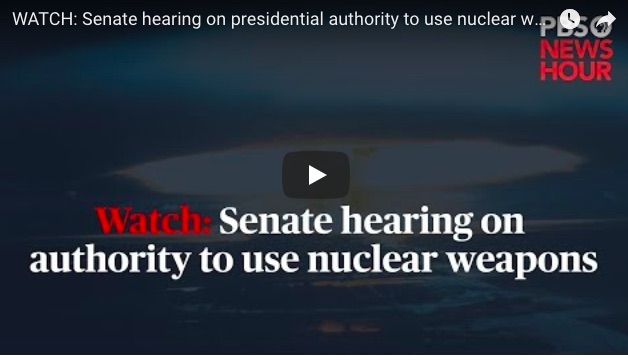DISARMAMENT & SECURITY .
An article by Jessica Corbett in Common Dreams (reprinted according to provisions of Creative Commons Attribution-Share Alike 3.0 License)
Despite Sen. Bob Corker’s (R-Tenn.) insistence that the congressional hearing on Tuesday about the authority to use nuclear weapons “is not specific to anybody,” it is the first hearing on this topic in decades, and comes at a time when U.S. President Donald Trump seems to have made a sport out of taunting North Korea’s leader as his nation advances its nuclear abilities.

Youtube video of Congressional hearings
Even before Trump took office and started threatening North Korea with “fire and fury,” the Pentagon had developed a $1.7 trillion plan > under Barack Obama “to build a new generation of nuclear-armed bombers, submarines, and missiles, as well as new generations of warheads to go with them”—even though, as William Hartung describes in an excerpt from his new book about nuclear weapons, “in every sense of the term, the U.S. nuclear arsenal already represents overkill on an almost unimaginable scale.”
Trump’s behavior throughout his campaign and presidency has heightened concerns about the threat of nuclear annihilation and has, for months, provoked global demands that the U.S. Congress strip Trump of his nuclear authority. “A tough-guy attitude on nuclear weapons, when combined with an apparent ignorance about their world-ending potential,” writes Hartung, “adds up to a toxic brew.”
Thus, advocates of nuclear disarmament welcomed the decision by Corker, chairman of the Senate Foreign Relations Committee, to hold the first nuclear authority hearing since 1976. Several groups and individuals offered real-time analyses and critiques of the testimonies, tweeting with the hashtag #NoRedButton.
(Article continued in right column)
Are we more than ever in danger of perishing in a nuclear war?
(See responses below)
(Article continued from left column)
A key takeaway seemed to be the president’s sweeping authority over whether the U.S. ever uses its nuclear weapons—and, as Ploughshares Fund president Joe Cirincione put it, “If a crazy president orders a legal nuclear strike from one of the already vetted war plans, there is no one that can stop him.”
Sen. Chris Murphy (D-Conn.) said members of Congress are concerned the president “is so unstable, is so volatile” that under the current authorization process, “he might order a nuclear weapons strike that is wildly out of step with U.S. national security interests.”
As Bloomberg News outlined—with help from Global Zero co-founder and nuclear expert Bruce G. Blair—earlier this year, despite brief consultation with military and civilian advisers, the commander-in-chief “has the sole authority to use nuclear weapons.”
“About five minutes may elapse from the president’s decision until intercontinental ballistic missiles blast out of their silos, and about fifteen minutes until submarine missiles shoot out of their tubes,” Bloomberg notes. “Once fired, the missiles and their warheads cannot be called back.”
“Trump can use the nuclear codes just as easily as he can use his Twitter account,” Sen. Ed Markey (D-Mass.) quipped during the hearing.
“There may be plans in place, right now, at the White House, to launch a preemptive war with North Korea using nuclear weapons—without consulting Congress,” Markey added. “No one human being should ever have the power.”
Earlier this year, Markey and Rep. Ted Lieu (D-Calif.) introduced legislation that would prevent the president from launching a nuclear first strike without a declaraton of war by Congress, with Markey saying at the time that “neither President Trump, nor any other president, should be allowed to use nuclear weapons except in response to a nuclear attack.”
Although the bill has been praised as fears continue to mount in the U.S. and beyond, many critics of nuclear weapons point to it as merely, in the words of Global Zero executive director Derek Johnson, “an important first step to reining in this autocratic system and making the world safer from a nuclear catastrophe.”
The most authoritative response to this question – for many years now – has been the Bulletin of the Atomic Scientist and their “Doomsday Clock”. Here is their most recent comment: “IT IS TWO AND A HALF MINUTES TO MIDNIGHT
2017: For the last two years, the minute hand of the Doomsday Clock stayed set at three minutes before the hour, the closest it had been to midnight since the early 1980s. In its two most recent annual announcements on the Clock, the Science and Security Board warned: “The probability of global catastrophe is very high, and the actions needed to reduce the risks of disaster must be taken very soon.” In 2017, we find the danger to be even greater, the need for action more urgent. It is two and a half minutes to midnight, the Clock is ticking, global danger looms. Wise public officials should act immediately, guiding humanity away from the brink. If they do not, wise citizens must step forward and lead the way. “